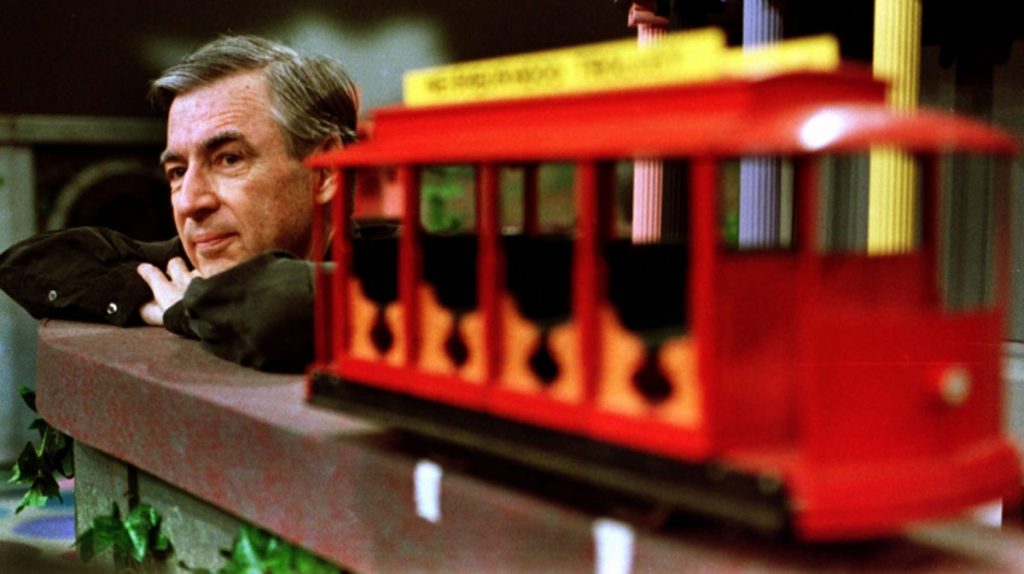Won’t You Be My Neighbor? (2018)

Won’t You Be My Neighbor? examines the life and work of Fred Rogers, aka Mr. Rogers, who was the creator and star of “Mister Rogers’ Neighborhood” on public television (PBS) from the years 1968 to 2001. He invited children to come into his home, sing them a song, make them feel safe as he imparted life lessons, then whisked them off to the Land of Make-Believe to further explore metaphors of understanding before he saw them off to the rest of their day. Rogers followed the career path to television as an alternative to pursing his Presbyterian ministry, primarily because he perceived that the level of silly and, to some degree, harmful entertainment that feeds the minds of youth on television was contributing to a culture of uncaring and self-centered youth who were seen as only vessels to toward whom to sell consumer products. Rogers felt that television could also be used as a medium in which he could do the most good if he were to use it as an educational and inspirational tool, especially in entertainment that he felt would best shape the minds of future generations to come.
The show is all about providing a feeling of safeness to the children in his audience to explore their feelings and feel safe in dealing with them, even if they are difficult to sort out. Many of the lessons of the show dealt with being proud of who you are, and in being accepting of others, especially those who may look, talk, or believe differently. Some of the shows even dealt with the subjects of death, including assassinations and national tragedies that children may hear about on the news that cause them severe discomfort and fear. Sometimes Rogers would even challenge the political sphere, creating scenarios that explored the ways to fight the forces of bigotry and mistreatment of people with disabilities, often derided by adults around them because that may be what they themselves were taught to do when they were children.
Many parents don’t ask children to express those inner feelings aloud, and they certainly don’t get to do that while watching typical Saturday morning cartoons or among their peers who are also in the same boat of unexpressed channels for their emotions. Fred Rogers, often through the use of puppet surrogates, forged a connection to the young eyes that were watching him, using that connection to deliver healing and reassuring messages that gave great comfort and stability in a chaotic world around them.
Morgan Neville, who gained a number of accolades for his excellent documentary, 20 Feet from Stardom, delivers a thoughtful and powerfully emotional two-hour look at the significance of an important man in the lives of many of us in our most formative of years. Interviews of some of the cast and crew that worked around Rogers, as well as Rogers’ wife and children, paint a picture of a caring man who sometimes had to battle great odds in order to maintain that connection with an audience who could not get an outlet from seemingly any other source. There aren’t a great deal of controversies to explore from within Rogers’ life but the film finds conflicts with his own artistic control of his show, having to fight for funding with congress, as well as dealing, at the end of his life, with a form of media that would blame Rogers and his philosophy that every life is special as teaching kids the wrong things.
This documentary uses archival footage of the show, as well as present and past interviews to paint the portrait of Rogers as a healing and comforting force for young children, especially during turbulent times that may occur within the nation. While initially dismissed as well-meaning but likely to be a fruitless endeavor, Rogers managed to make that connection with the children in the audience, to the point where they would line up around the block to come see him in a public forum. To many of these children, Rogers was more than a TV personality, but a friend and confidant, and a key person in their lives at a time when they did not understand the adult world around them, and that adult world didn’t seem to understand them in return.
More trivial things are addressed within the film that colors in even Rogers as human, who may have his own flaws and idiosyncrasies, from his obsession with the number “143” (the count of the letters within the phrase, “I love you” — Rogers strove every day to maintain his weight at exactly 143 lbs.), to having to address the rumors of being either gay or somehow predatory in his inclinations. This last part, of course, is refuted, but an interesting anecdote does emerge on how Rogers dealt with the knowledge that one of his cast of actors on the show was gay, and his own internal struggles and eventual acceptance of the person for who they are. It’s one of the most touching of stories within a very affecting film.
Just as Rogers served for many people as a balm of healing during turbulent times in one’s childhood, so too does Won’t You Be My Neighbor? serve as a gentle reminder of the power of civility, kindness, compassion, respect, self-worth, and understanding, especially in how we conduct ourselves in front of our children, as well as in front of our peers. Just like Rogers himself would promote, the documentary provokes us to thoughts and emotions that may be sometimes uncomfortable to deal with, but we appreciate the connection to a friend whose voice continues to be an essential life preserver in our troubled times.
Qwipster’s rating: A+
MPAA Rated: PG-13 for some thematic elements and language
Running Time: 94 min.
Director: Morgan Neville
